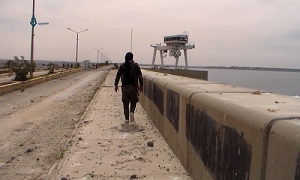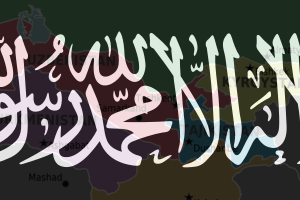Central Asian Militants’ Shifting Loyalties in Syria: The Case of The Turkistan Islamic Party
By Jacob Zenn
April 19, 2017, the CACI Analyst
Since the August 30, 2016 car bombing in front of the Chinese embassy in Bishkek, Kyrgyzstan, concerns have increased about Central Asians carrying out attacks in their homelands after they leave the war in Syria. A growing number of Central Asians in Syria, especially in the Turkistan Islamic Party (TIP), are becoming dissatisfied with al-Qaeda because it is limiting external operations, while the terrorist organization known as the Islamic State in Iraq and Syria (ISIS) is actively promoting attacks abroad. Moreover, a number of TIP fighters disagree with the Syrian al-Qaeda affiliate's re-branding to appear "less al-Qaeda-like" and "more Syrian." ISIS is eager to see defected TIP members in its ranks, which could enable these fighters to target Central Asian or Chinese interests abroad in the name of ISIS.

The IMU is extinct: what next for Central Asia's jihadis?
By Jacob Zenn
May 3rd, 2016, The CACI Analyst
For more than a decade after the September 11, 2001 attacks in the U.S., the Islamic Movement of Uzbekistan (IMU) was the “bogeyman” of Central Asian militancy. It was the most well-known militant group in Central Asia and abroad, even though it was in exile in Afghanistan and Pakistan under the protection of the Taliban and al-Qaeda. Years of drone strikes and counter-insurgency operations failed to eliminate the IMU. Ironically, however, it was neither the U.S. nor coalition forces that destroyed the IMU. Rather, it was the Taliban who liquidated the IMU in late 2015 as punishment for its “betrayal” of the Taliban (and al-Qaeda) by pledging loyalty to Abu Bakr Al-Baghdadi, leader of the terrorist organization calling itself the Islamic State (ISIS). This will change the nature of the militant threat to Central Asia and force a reconsideration of Uzbekistan’s counter-extremism measures.
Islamic State in Central Asia: threat or opportunity
By Charlie Smith (08/07/2015 issue of the CACI Analyst)
Central Asia is a key region that many believe has fallen into the crosshairs of the terrorist group calling itself the Islamic State (ISIS). Local governments are gravely concerned about returning fighters and possible ISIS infiltration in the region, and foreign powers, especially neighboring Russia and China, have expressed their deep concerns. This grim picture, however, obscures a more complex, and perhaps more accurate, story. Might the specter of ISIS have less to do with its on-the-ground ability to destabilize the region and more to do with the geopolitical concerns of those who are stating these threats?

Is the North Caucasus becoming another battlefield in the global jihad?
By Tomáš Baranec (08/07/2015 issue of the CACI Analyst)
The continuous crackdowns on North Caucasian militants conducted by Russian security forces intensified in first half of 2015, deepening the crisis caused by the split in the Caucasus emirate. Although security forces are targeting both Caucasus emirate loyalists and pro-Islamic State rebels, the former appear less resilient to such operations. Paradoxically, in comparison to the pro-ISIS group, the Caucasus emirate is better established and hierarchal and its cells are therefore more easily infiltrated by moles. The assassination of the Caucasus emirate’s emir Aliaskhab Kebedov, nom de guerre Ali Abu Muhammad, dealt a fatal blow to the virtual theocracy, facing a decreasing pool of possible recruits and increasing competition from ISIS. Despite such developments, it remains unlikely that ISIS, with its brutal methods, will prove capable of establishing itself in the North Caucasus.






